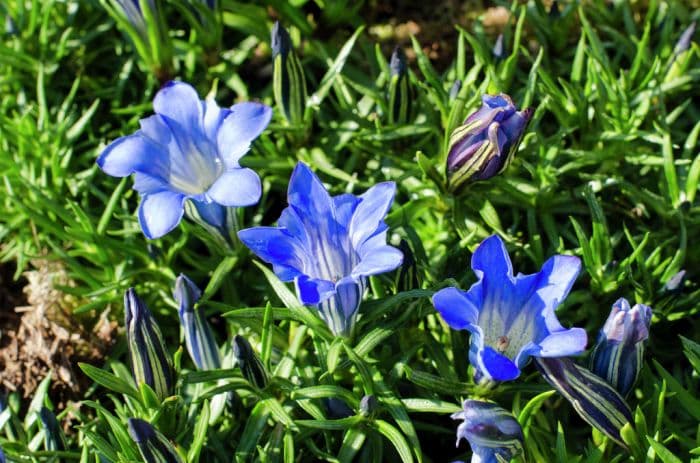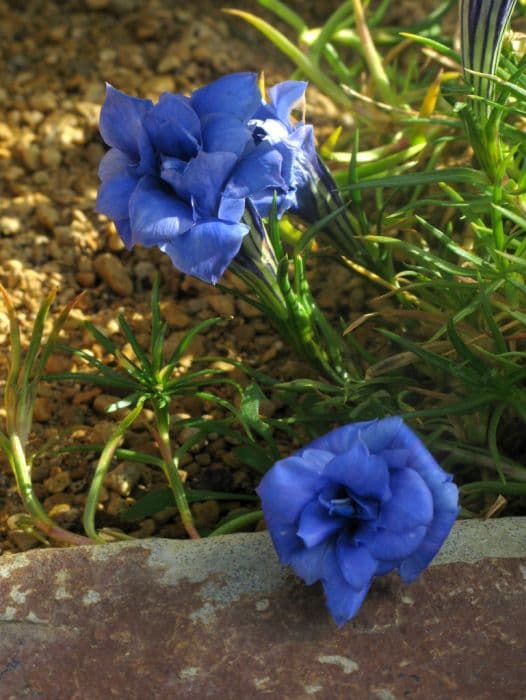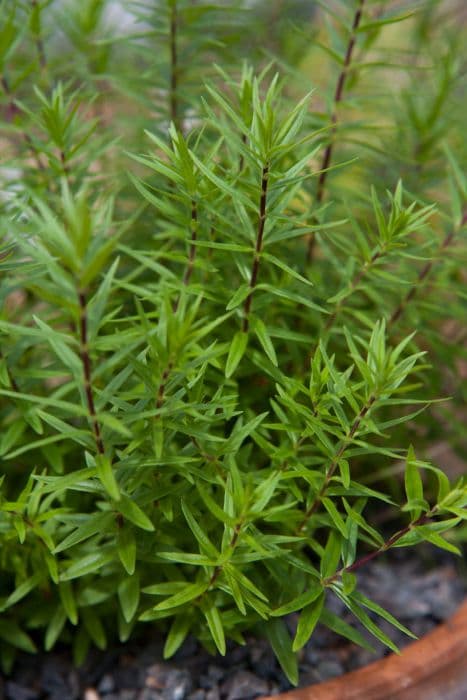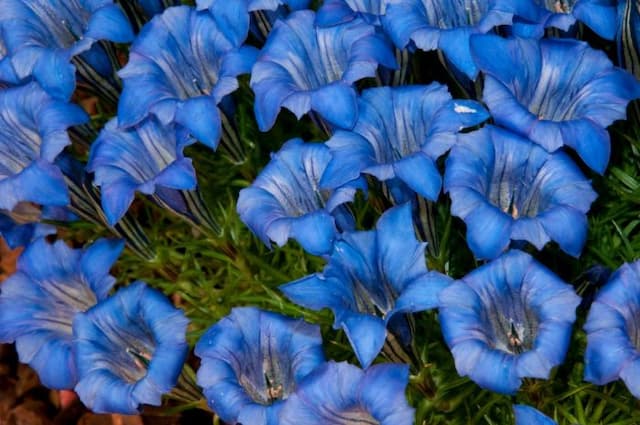Gentian Gentiana 'Berrybank Sky'

ABOUT
Gentiana 'Berrybank Sky' is a visually stunning plant recognized for its intense, bright blue trumpet-like flowers which can catch anyone's eye in a garden setting. The flowers, typically blooming in late summer to fall, are large and funnel-shaped with a vivid blue hue that may display subtle striped patterning inside. The foliage of the plant is a rich green, providing a lush backdrop for the striking blue flowers. The leaves are lance-shaped and may have a slightly waxy texture, arranged neatly along the upright, sturdy stems that cradle the blooms. The overall appearance of Gentiana 'Berrybank Sky' exudes a vibrant splash of color and an attractive form that makes it a popular choice for garden enthusiasts looking to add a touch of brightness to their landscape.
About this plant
 Names
NamesFamily
Gentianaceae
Synonyms
Berrybank Sky Gentian
Common names
Gentiana 'Berrybank Sky'.
 Toxicity
ToxicityTo humans
Gentian 'Berrybank Sky' is not known to be toxic to humans. Gentians in general are often used in herbal medicine for their digestive stimulant properties. However, always exercise caution and consult with a professional before ingesting any plant for medicinal purposes. If you suspect poisoning from any plant, seek medical attention immediately.
To pets
Gentian 'Berrybank Sky' is not known to be toxic to pets. While gentians are not commonly reported to cause poisoning in pets, individual animals may have adverse reactions to ingesting plant material. It is always best to prevent pets from eating plants as a precaution. If you notice any signs of distress after your pet has ingested any plant, contact your veterinarian for advice.
 Characteristics
CharacteristicsLife cycle
Perennials
Foliage type
Deciduous
Color of leaves
Green
Flower color
Blue
Height
1-2 feet (30-60 cm)
Spread
1-2 feet (30-60 cm)
Plant type
Herb
Hardiness zones
Varies
Native area
Europe
Benefits
 General Benefits
General Benefits- Ornamental Value: Gentiana 'Berrybank Sky', commonly known as Gentian, features striking blue flowers that add visual interest to gardens and landscapes.
- Garden Diversity: Incorporating Gentian can contribute to a diverse and well-balanced garden ecosystem.
- Pollinator Attraction: The vibrant flowers attract bees, butterflies, and other pollinators, supporting local biodiversity.
- Low Maintenance: Once established, Gentian plants are known for their low maintenance requirements, making them a practical choice for gardeners.
- Tolerant of Cool Climates: Gentians are well-adapted to cooler climates and can thrive where other plants might struggle.
- Seasonal Color: They typically bloom in late summer to fall, providing color during a time when many other plants are beginning to fade.
- Rock Gardens and Borders: Gentians are suitable for rock gardens and can be used to create beautiful borders or edges in garden design.
 Medical Properties
Medical PropertiesThis plant is not used for medical purposes.
 Air-purifying Qualities
Air-purifying QualitiesThis plant is not specifically known for air purifying qualities.
 Other Uses
Other Uses- Gentiana 'Berrybank Sky' can be used as a natural fabric dye, providing a range of blue hues depending on the mordant used.
- The bitter properties of gentians can be infused into liquors or bitters to create unique cocktails with a distinct flavor profile.
- Gentiana 'Berrybank Sky' is often utilized in rock gardens due to its compact growth and ability to thrive in poor soils.
- Their vibrant blue flowers can be used to add color to salads or as an edible garnish on desserts, providing a splash of natural color.
- These plants can be planted to create a natural border that requires minimal maintenance and does not encroach on adjacent plantings.
- Their extensive root system can help to stabilize soil and prevent erosion on sloped garden areas or banks.
- Photographers sometimes use Gentiana 'Berrybank Sky' as a foreground subject in landscape photography for its striking color.
- Floral artists can dry the blooms for use in everlasting flower arrangements or as components in potpourri.
- The plant's resistance to deer and other herbivores makes it a good candidate for gardens in areas with wildlife pressure.
- Gentiana can be used in educational settings such as school gardens to teach students about plant biology and pollination, as they attract bees and butterflies.
Interesting Facts
 Feng Shui
Feng ShuiThe plant Gentiana is not used in Feng Shui practice.
 Zodiac Sign Compitability
Zodiac Sign CompitabilityThe plant Gentiana is not used in astrology practice.
 Plant Symbolism
Plant Symbolism- Endurance: Gentians, with their rugged native habitats, symbolize the ability to endure and thrive in challenging conditions.
- Victory: Because of their late blooming, gentians are associated with overcoming obstacles and achieving success after a long struggle.
- Integrity: The consistent and vivid blue of gentians represents honesty and a commitment to one's values.
- Persistence: The plant's determination to grow in inhospitable environments signifies tenacity and the will to push through hardships.
 Water
WaterThe Gentian, commonly referred to as Gentiana 'Berrybank Sky', should be watered thoroughly, allowing the water to penetrate deep into the soil, encouraging root growth. This should be done when the top inch of soil feels dry to the touch, which could be once a week depending on climate and soil conditions. It is better to water deeply and less frequently rather than a little at a time to prevent shallow root growth. For outdoor plants, apply approximately 1 gallon of water per square foot every time you water. Adjust frequency based on rainfall, temperature, and the plant's stage of growth, keeping in mind that overwatering can be as harmful as under-watering.
 Light
LightGentians like the Gentiana 'Berrybank Sky' thrive in full sun to partial shade conditions. The best spot for this plant would be where it can receive at least several hours of direct sunlight a day, but it must also be protected from the hot afternoon sun, especially in warmer climates. Dappled shade can help protect the plant from excessive heat while still providing it with a sufficient amount of light.
 Temperature
TemperatureGentians, including the Gentiana 'Berrybank Sky', prefer a cooler climate and perform best with daytime temperatures ranging between 50°F and 70°F. Nighttime temperatures should ideally be lower, staying within the range of 40°F to 50°F for optimal growth. They can tolerate temperatures down to about 20°F but sustained cold below this point can damage the plant, and temperatures above 80°F can cause stress.
 Pruning
PruningPrune the Gentiana 'Berrybank Sky', commonly known as Gentians, to remove any spent blooms and dead foliage to encourage new growth and a tidier appearance. This can be performed after the flowering season ends, typically in the fall. Pruning can also help maintain the plant's shape and prevent it from becoming too leggy. In general, minimal pruning is required, and it should not be done excessively as it can damage the plant.
 Cleaning
CleaningAs needed
 Soil
SoilGentian 'Berrybank Sky' thrives best in a well-draining, loamy soil with a slightly acidic to neutral pH range of 5.5 to 7.0. A mix of garden soil, peat moss, and perlite or coarse sand is ideal for ensuring proper drainage and aeration while maintaining adequate moisture.
 Repotting
RepottingGentians, including 'Berrybank Sky', generally require repotting every 2-3 years or when they outgrow their current container. It's best to repot in the spring before new growth begins.
 Humidity & Misting
Humidity & MistingGentian 'Berrybank Sky' prefers moderate humidity but is relatively adaptable to different humidity levels. Strive to maintain a level that mimics its natural alpine habitat, without the air being too dry.
 Suitable locations
Suitable locationsIndoor
Provide bright light and cool temperatures.
Outdoor
Plant in partial shade and cool soil.
Hardiness zone
4-7 USDA
 Life cycle
Life cycleGentiana 'Berrybank Sky', commonly known as Gentian, begins its life as a seed that requires stratification, undergoing a period of cold to break dormancy before germination. Upon sprouting, the seedling grows into a vegetative plant, developing a rosette of leaves at ground level. As the Gentian matures, it enters the flowering stage, typically in late summer or early fall, when it produces striking blue trumpet-shaped flowers which are its most recognizable feature. After pollination, often by insects attracted to the vibrant flowers, the plant produces fruit in the form of capsules containing numerous tiny seeds. These seeds are dispersed by wind, water, or other means, continuing the propagation cycle. In winter, the above-ground parts of the plant die back, while the roots survive to produce new growth in the following spring.
 Propogation
PropogationPropogation time
Spring-Early Summer
The Gentiana 'Berrybank Sky', commonly known as Gentian, is often propagated by seed or by division. The most popular method is seed propagation which is typically done in winter or early spring. To propagate by seed, first, collect seeds from a mature plant. Sow the seeds shallowly in a tray of well-draining soil mix and gently press them into the surface. Cover the tray with a thin layer of soil no more than 1/8 inch (approximately 3 mm) deep. Keep the soil moist but not waterlogged and maintain a temperature of about 60-70 degrees Fahrenheit (15-21 degrees Celsius). Place the tray in a location with bright, indirect light. Seed germination can be slow and may take several weeks or even months, so patience is crucial. Once seedlings emerge and are large enough to handle, they can be transplanted into individual pots to grow on before being planted out in the garden.









